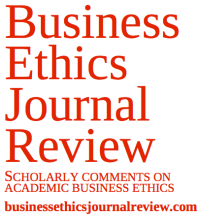v10n3: Young on Singer on Disruptive Innovation
Posted: April 12, 2022 Filed under: Uncategorized Leave a comment
A COMMENTARY ON Abraham Singer (2019), “Business Ethics and Efficiency: The Market Failures Approach,” in The Form of the Firm: A Normative Political Theory of the Corporation, New York: Oxford University Press, 218–236.
Abstract:
Abraham Singer defends the Market Failures Approach (MFA) to business ethics from the objection that the MFA cannot account for the moral value of disruptive innovation. Singer argues that critics who attack the MFA on these grounds face a dilemma: either accept the MFA, along with its general prohibition on disruptive innovation, or reject the very idea that business and market competition should be understood as rule-governed activities at all. This commentary argues that the dilemma Singer poses to MFA critics is a false one.
To download the full PDF, click here: Young on Singer on Disruptive Innovation
Carson Young is an assistant professor in SUNY Brockport’s School of Business and Management.
v10n2: Kuyumcuoglu Responds to Kates
Posted: March 24, 2022 Filed under: Uncategorized Leave a comment “A Contractualist Defense of Sweatshop Regulation,” by Huseyin S. Kuyumcuoglu
“A Contractualist Defense of Sweatshop Regulation,” by Huseyin S. Kuyumcuoglu
AN INVITED RESPONSE TO Michael Kates (2021), “Sweatshop Regulations and Ex Ante Contractualism,” Bus Ethics J Rev 9(6): 33–39, https://doi.org/10.12747/j1i06
Abstract:
Kates argues that ex ante contractualism fails to defend interference with sweatshops on moral grounds. In this commentary, I argue that Kates does not apply this approach correctly. Ex ante contractualism, indeed, successfully defends interference and thus should still be considered an appealing alternative to other moral approaches for evaluating when and how to interfere in sweatshop conditions to help workers.
To download the full PDF, click here: Kuyumcuoglu Responds to Kates
Huseyin S Kuyumcuoglu is a visiting scholar at Kadir Has University and a co-founding member of the Society for Practical Philosophy, Turkey (Pratik Felsefe Toplulugu).
v10n1: Reeves and Sinnicks Respond to Nevasto
Posted: January 31, 2022 Filed under: Uncategorized Leave a comment “Adorno’s Critique of Work in Market Society,” by Craig Reeves and Matthew Sinnicks
“Adorno’s Critique of Work in Market Society,” by Craig Reeves and Matthew Sinnicks
A RESPONSE TO Jaakko Nevasto (2021), “Adorno’s Critical Moral Philosophy and Business Ethics,” Bus Ethics J Rev 9(7): 40–46, https://doi.org/10.12747/j1i07
Abstract:
Jaakko Nevasto has offered a number of thoughtful criticisms of our attempt to show that Adorno’s work can fruitfully be brought to bear on topics in business ethics. After welcoming his constructive clarifications, we attempt to defuse Nevasto’s main objections and defend our application of Adorno, focusing in particular on the topics of moral epistemology, needs, and the possibility of genuine activity – and thus good work – within capitalist society.
To download the full PDF, click here: Reeves and Sinnicks Respond to Nevasto
Craig Reeves is a lecturer in law at Birkbeck College, London.
Matthew Sinnicks is a lecturer in organisational behaviour at Henley Business School, University of Reading
v9n9: Evans on Smith and Block on Insider Trading
Posted: December 28, 2021 Filed under: Uncategorized Leave a comment “Insider Trading and Sabotage,” by Anthony Evans
“Insider Trading and Sabotage,” by Anthony Evans
A COMMENTARY ON T. L. Smith and W. E. Block (2016*), “The Economics of Insider Trading: A Free Market Perspective,” J Bus Ethics 139(1): 47–53.
Abstract:
Insider trading is widely reviled, and yet – as Smith and Block argue – it is consistent with the basic principles of a free market system. This article draws attention to an argument against insider trading that Smith and Block don’t address, namely the potential for sabotage. However, this issue still fails to justify insider-trading legislation, and thus ultimately supports Smith and Block’s view that regulatory attempts to prevent it are misplaced.
To download the full PDF, click here: Evans on Smith & Block
Anthony J. Evans is Professor of Economics at ESCP Business School. He has been an Affiliate Faculty Member on the Microeconomics of Competitiveness Programme at Harvard Business School, and was a Fulbright Scholar-in-Residence at San Jose State University.
* Editorial note: This target article is outside Business Ethics Journal Review’s usual three-year window for Commentaries. That is due to editorial mishandling of the author’s original submission, which was accomplished within the three-year window. The Editors apologize to the author for the error.
v9n8: Allison on Scharding on Non-Centrally Regulated Currencies and Volatility
Posted: October 26, 2021 Filed under: Uncategorized Leave a comment
A COMMENTARY ON Tobey Scharding (2019), “National Currency, World Currency, Cryptocurrency: A Fichtean Approach to the Ethics of Bitcoin,” Bus & Soc Rev 124(2): 1–20.
Abstract:
Tobey Scharding claims that Bitcoin’s lack of a central regulator makes it open to price fluctuations. I argue that a currency not having a central regulator does not necessitate it being more volatile than centrally regulated currencies. First, I argue that Scharding’s reason for suggesting that Bitcoin is open to price fluctuations – its potential to face legal restrictions – is also faced by centrally regulated currencies. Second, I use silver in London as an example of a non-centrally regulated currency with relatively low price volatility when compared to other centrally regulated currencies showing that non-centrally regulated currencies are not necessarily more volatile.
To download the full PDF, click here: Allison on Scharding
Andrew Allison is PhD student in the Department of Philosophy at the University of Calgary.
v9n7: Nevasto on Reeves and Sinnicks on Adorno’s Critical Moral Philosophy
Posted: July 29, 2021 Filed under: Uncategorized Leave a comment Adorno’s Critical Moral Philosophy and Business Ethics, by Jaakko Nevasto
Adorno’s Critical Moral Philosophy and Business Ethics, by Jaakko Nevasto
Abstract:
Reeves and Sinnicks present Theodor Adorno as a philosopher with a sombre message to business ethics. Capitalist markets distort our needs and work in business organisations stultifies our moral capacities. Thus, the discipline’s self-understanding must be revised, and supplemented with reflections on what would be good work: free creative activity. After raising some questions about their interpretation of Adorno’s writings on human needs, I argue that the paper does not contain all the necessary resources to support its ferociously critical claims. Once such resources are made available, however, the appeal to a notion of good work is no longer viable.
To download the full PDF, click here: Nevasto on Reeves and Sinnicks
Jaakko Nevasto‘s research focuses on business ethics, critical theory, and the philosophy of markets. (He can be reached at j.nevasto@outlook.com )
v9n6: Kates on Regulating Sweatshops
Posted: July 14, 2021 Filed under: Uncategorized Leave a comment Sweatshop Regulations and Ex Ante Contractualism, by Michael Kates
Sweatshop Regulations and Ex Ante Contractualism, by Michael Kates
Abstract:
Kuyumcuoglu argues that defenders of sweatshop regulations should reject consequentialism and accept an ex ante interpretation of contractualism instead. In this Commentary I show that Kuyumcuoglu’s argument doesn’t succeed. Defenders of sweatshops shouldn’t become ex ante contractualists because its advantages on this issue are more apparent than real.
To download the full PDF, click here: Kates on Regulating Sweatshops
Michael Kates is an Assistant Professor in the Department of Philosophy at Saint Joseph’s University.
v9n5: Silver on Democracy and Markets
Posted: June 21, 2021 Filed under: Uncategorized Leave a comment Pandemic Preparation, Democracy, and the Morality of the Market, by David Silver
Pandemic Preparation, Democracy, and the Morality of the Market, by David Silver
A COMMENTARY, IN THE BUSINESS ETHICS IN TIMES OF PANDEMIC VIRTUAL SYMPOSIUM
Abstract:
This Commentary investigates ethical issues surrounding the US government’s attempt to partner with a private company to produce a new low-cost ventilator as part of its pandemic preparation plans. I argue that firms have distinct duties with respect to such public-private partnerships. In contrast to approaches that analyze these duties in terms of an “implicit morality” of the market, I analyze them in terms of democratically authorized plans regarding how to structure the market.
To download the full PDF, click here:
Silver on Democracy and Markets
David Silver holds the Chair in Business and Professional Ethics and directs the W. Maurice Young Centre for Applied Ethics in the School of Population and Public Health at the University of British Columbia, with a joint appointment at the Sauder School of Business.
Virtual Symposium on Business Ethics in Times of Pandemic
Posted: June 11, 2021 Filed under: Uncategorized Leave a commentAbout a year ago, the editors of BEJR issued a call for submissions to a “virtual symposium” on business ethics in times of pandemic. We’ve been pleased to receive a number of submissions. The first three four Commentaries published as part of our virtual symposium are listed here. We’ll add to it as we publish additional commentaries. (And our original Call for Submissions — which remains open! — is appended below.)
Pandemic Preparation, Democracy, and the Morality of the Market, by David Silver
The Peculiar Nature of the Duty to Help During a Pandemic, by Santiago Mejia
What About Price Gouging By Employees?, by Alexander P Reese and Ingo Pies
Social Media Ethics and the Politics of Information, by Jennifer Forestal and Abraham Singer
Call for Submissions!
The Business Ethics Journal Review is seeking submissions for a virtual symposium on “Business Ethics in Times of Pandemic.”
Is the existing literature useful on the question of price-gouging? Given what has been written about CSR, what are an employer’s obligations to employees when business drops to zero? Should consumers embrace, or avoid, delivery services during a pandemic, in light of what has been written about the ethics of the gig economy? How and to whom should cleaning products and personal protective equipment (PPE) be marketed during a pandemic? These are just a few suggestions for topics that might be tackled as business ethics scholars contemplate the current crisis.
Business Ethics Journal Review (ISSN 2326-7526) is a peer-reviewed, online journal that has been actively publishing since 2013. We publish short (1,000-2,000 word) commentaries on peer-reviewed articles. It is edited by Alexei Marcoux and Chris MacDonald.
We are currently seeking short, focused commentaries on business ethics related to the current Covid-19 crisis. For this special symposium, we are relaxing our normal rules, while attempting to stay true to our basic mission. Accordingly, we offer the following guidelines for submissions:
– All submissions must be between 1,000 and 2,000 words, inclusive of abstract and citations.
– In light of our status as a journal review, submissions should be focused on commenting on prior literature.
– Authors are strongly encouraged to focus on literature from the last 10 years (the usual BEJR rule is 3 years!)
There is NO FIXED DEADLINE for this call, but potential authors should contact the editors (editors@bejr.org) to discuss their potential contribution.
v9n4: Honouring Dr. Arthur Wesley Cragg
Posted: June 3, 2021 Filed under: Uncategorized Leave a comment
Wesley Cragg
In Memorium: The Contribution of Dr. Arthur Wesley Cragg, by Mark S Schwartz
AN INVITED TRIBUTE TO THE LATE CANADIAN BUSINESS ETHICS PIONEER
Abstract: The author comments on two journal articles authored by his former PhD supervisor, Dr. Arthur Wesley Cragg.
To download the full PDF, click below:

Mark Schwartz
Mark S. Schwartz is Associate Professor, Management and Ethics in the School of Administrative Studies, York University.


